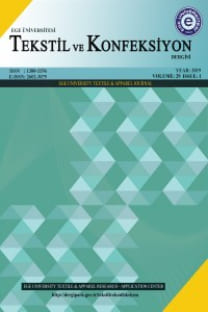Konfeksiyon sanayiinde modüler üretim sistemi ile ilerleyen demet sisteminin karşılaştırılması
The comparison of the modular production system and progressive bundle system in apparel industry
___
- 1.ACAR, N., 2002, Tam Zamanında Üretim, MPM Yayınları, Ankara
- 2.ATALAY, N., BİRBİL, D., DEMİR, N. ve YILDIRIM, Ş., 1998, KOBİ'lerin Esnek Üretim Sistemleri Yönünden irdelenmesi ve Bir Uygulama, MPM Yayınları, Ankara
- 3.BERG, P., APPELBAUM, E., BAILEY, T., KALLEBERG, L., 1995, The Performance Effects of Modular Production in Apparel Industry, Technical Paper No : 216
- 4.GLOCK, R.E. and KUNZ , G.I., 1995, Apparel Manufacturing - Sewn Product Analysis, Prentice- Hall International Limited, London, ISBN 0-02-344142-9
- 5.Juki Unit Syncrhro System (JUSS), 1982
- 6.LOWSON, B., KING, R., HUNTER, A.,1999, Quick Response - Managing The Supply Chain To Meet Consumer Demand
- 7.ROGERS, G.G., BOTTACI, L, 1997, Modular Production Systems: A New Manufacturing Paradigm, Journal of Intelligent Management
- ISSN: 1300-3356
- Yayın Aralığı: 4
- Yayıncı: Ege Üniversitesi Tekstil ve Konfeksiyon Araştırma & Uygulama Merkezi
Konfeksiyonda kabul örneklemesi
Keten saklarından enzimatik işlemlerle keten liflerinin elde edilmesi
Ahmet ÇAY, Sema Eylen NAMLIGÖZ, Ayşegül EKMEKÇİ
Konfeksiyon sanayiinde modüler üretim sistemi ile ilerleyen demet sisteminin karşılaştırılması
Esra DİRGAR, Ziynet ÖNDOĞAN, M. Çetin ERDOĞAN
Konfeksiyon çalışanlarının görevleri ve sağlık problemleri arasındaki ilişki
Eylen Sema NAMLIGÖZ, Tülin ÖKTEM, Necdet SEVENTEKİN
Denim mamüllerin yıkama işlemlerindeki yenilikler
Jüt'ün ön terbiye işlemlerindeki güncel gelişmeler
Eylen Sema NAMLIGÖZ, Kerim DURAN
Ring iplik makinesinde apron ve manşon sertliklerinin iplik tüylülüğüne etkisi üzerine bir araştırma
Pınar ÇELİK, Mustafa E. ÜREYEN
